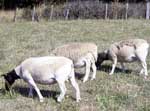Home Lambs For Sale Dorper Information
Dorper Sheep Information
The Breed
 Following
extensive crossbreeding experiments in the 1930's with local indigenous sheep
breeds and the many imported British and European sheep breeds, the Dorper was
developed as a specialist meat breed in South Africa around 1942. Two color
phases of this breed have been developed from initial crosses between Blackhead
Persian ewes and Dorset Horn rams, with the black headed type referred to as the
Dorper and White Dorper denoting the all white type. Color preference is a
matter of personal choice.
Following
extensive crossbreeding experiments in the 1930's with local indigenous sheep
breeds and the many imported British and European sheep breeds, the Dorper was
developed as a specialist meat breed in South Africa around 1942. Two color
phases of this breed have been developed from initial crosses between Blackhead
Persian ewes and Dorset Horn rams, with the black headed type referred to as the
Dorper and White Dorper denoting the all white type. Color preference is a
matter of personal choice.
The Dorper is an easy care, low labor input breed that does not require shearing as its short winter covering of wool and hair is shed annually in the same manner as cattle or goats. There can be some variation in the degree of shedding, with some Dorpers shedding completely and others retaining fiber on the back (Figure 1).
This trait appears to be highly heritable and using a good shedding ram will typically improve shedding ability in his offspring.
The Dorper has a reputation for its adaptability to harsh conditions from the hottest and driest to the wettest and coldest environments, and is the most numerous meat sheep breed in South Africa. The Dorper is becoming increasingly popular as a specialist meat producing sheep in Australia, as well as the Middle East, China, Canada, South America, Mexico and the United States and is forecast by many international authorities to become a major sheep breed in low management input systems throughout the world.
Characteristics of the breed include an unrestricted breeding season with high ram fertility and vigor, excellent milk production and good mothering ability in the ewes and rapid growth rates in lambs with excellent carcass conformation. Taste tests confirm the tenderness and superior taste of Dorper meat. (see Meat quality comparison)
Dorpers are non-selective grazers with excellent feed conversion efficiency which allows lambs to finish well on poor quality feed. Dorpers have a thicker skin than wooded breeds which, as well as being more resistant to grass seed penetration makes their skins highly prized as apparel leather.
So, some reasons to breed Dorpers:
- No shearing required
- Resistance to fly strike
- No molesting
- No crutching
- Less chemicals
- Non selective grazers
- Continuous breeding season
- High reproduction rate
- Rapid weight gain
- Excellent carcass conformation and fat distribution
- Quiet temperament
- Highly adaptable - thrive in arid, semi-tropical to cool temperate areas
- Hardy and disease resistant
- Early sexual maturity
- Excellent mothers, easy lambers